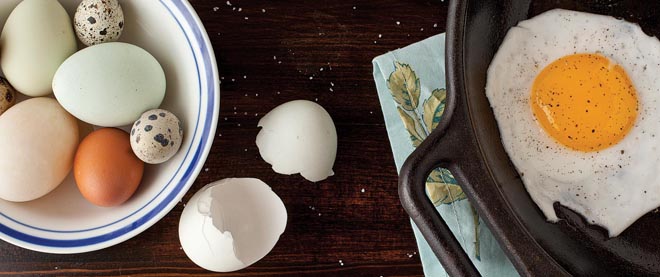The duck egg definitely comes first
In this new shell game, the chicken egg is supplanted by more exotic offerings
Reena Newman
Share

There was a time not so very long ago when, if a waiter inquired how you liked your eggs, chances were good that all they wanted to know was if you fancied them poached, over easy or sunny-side up. But I can happily report this tedious era is drawing to a close. The tipping point came mid-summer when, at a new but otherwise unremarkable brunch spot in Toronto, the waiter did not even ask my preference before excitedly volunteering his own.
“The poached duck egg with duck hash is awesome,” he said. “Just so you know!”
I did know. Because that very morning at home I had enjoyed a poached duck egg on the buttery bed of a flaky, oven-crisped croissant. So I declined and ordered a salad.
Still, the significance of the moment seemed obvious. When run-of-the-mill diners start serving duck eggs, the question of how you like your eggs can no longer be assumed to apply to what happens in the pan, but rather the more important business preceding that—as in what sort of fowl laid them.
So with a view to fine-tuning my answer, I promptly set about harvesting samples of eggs newly available around town. The extent of the latest options proved dazzling.
At St. Lawrence Market in Toronto, I found beautiful pale-blue-shelled eggs laid by a South American chicken called Araucana, a white, rather Hasidic-looking bird with fluffy plumage that dangles from its tiny cheeks. In Chinatown, I found a source for the small eggs that young chickens lay in their first months of production—practice eggs if you will, that at just 40 g each (about half the mass of an extra-large) are too small to make the minimum standard supermarket grade for sale. Next, at an uptown butcher, I procured small, beige eggs laid by silkies—the black-skinned chickens the Chinese favour for stock and soup.
I found duck eggs from an Ontario farm called Cro Quail in Saint-Anns, larger ones from Brome Lake Ducks of Knowlton, Que., and a relative monster from a Mennonite farm near Kitchener, Ont. Then I found a goose egg that dwarfed them all at 175 g. Looking for more I headed to the Riverdale farmers’ market, but found the turkey eggs were sold out and had to settle for quail’s eggs. Then I got cooking.
What I learned about chicken eggs is that as long as the birds are fed well and have occasion to run free, the breed makes only a subtle difference in flavour. Compared to the basic “organic” supermarket egg, none of my samples distinguished themselves assertively when treated identically in the pan. And while at first the relatively obscure silkie eggs enjoyed the greatest appeal around the breakfast table because of their delicacy and diminutive size, they were in turn eclipsed by the mini-eggs sourced in Chinatown, which were both fresher and cheaper than any other egg of the batch.
All the same, chickens young, old or foreign proved no match for ducks, whose eggs are sublime. Their richness makes ordinary chicken eggs seem as tasteless as egg whites. When properly poached, their runny yolks are as satisfying as a heavy French sauce. And when scrambled, they taste rich and creamy without butter and cream (which of course means that when you fold in lots of the same, you are guaranteed a memorable experience). On the all-important scale of richness, not even the goose egg could compete.
Further experimentation revealed another little known facet of duck-egg supremacy. While chicken eggs scramble best at the lowest possible heat, duck eggs possess the opposite quality. Go slow, and the yield is springy and chewy. But fast stirring and high heat produces unexpectedly creamy bliss. Which is to say that no day is too short for a perfect, scrambled duck egg.
Except, it turns out, for the day before the blood test with your annual physical. My results prompted me to do a little extra research, and alas, my miracle food is a bomb. Where large chicken eggs pack about 200 mg of cholesterol each, a standard duck egg boasts 620 mg—and the goose egg tops out at more than 1,200 mg, or about 400 per cent of the recommended daily intake. The horrible news left me too short of breath to work out the statistics for my latest masterpiece: a duck egg omelette stuffed with shredded duck confit.